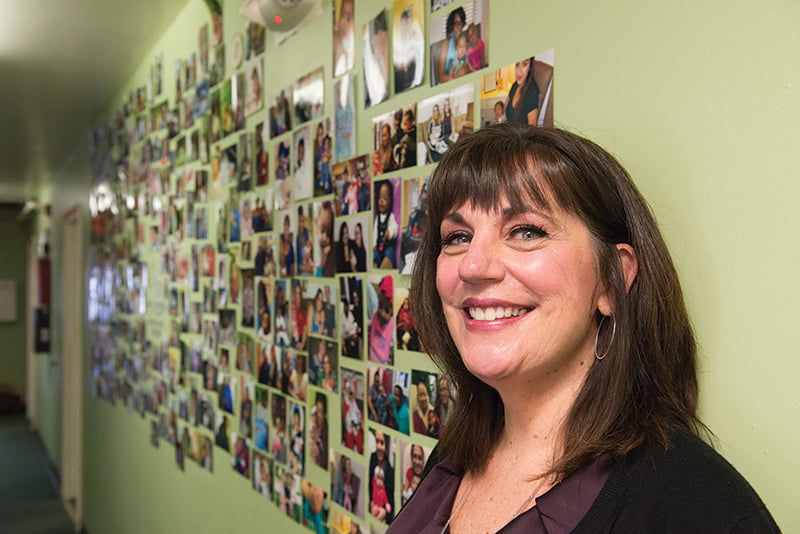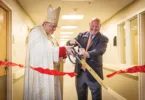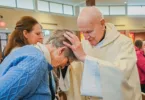
Mary Mason, executive director of the Wyandotte Pregnancy Clinic in Kansas City, Kansas, stands in front of a wall of women and children the clinic has helped over the years. Although the first were founded in the late 1960s, pregnancy clinics now number more than 2,500 throughout the United States. LEAVEN PHOTO BY JOE BOLLIG
By Joe Bollig
joe.bollig@theleaven.org
KANSAS CITY, Kan. — Ashley was young, single, troubled and pregnant. She already had two children and a host of problems.
Grasping at any sort of help she could get, Ashley went to the Wyandotte Pregnancy Clinic, located at 3021 N. 54th St. in Kansas City, Kansas, and listened to what the counselors had to say.
“These people are really nice, but I’m never coming back,” Ashley told WPC executive director Mary Mason later. “I’ve got to have an abortion.”
Ashley made an appointment and went to a Kansas City area abortion clinic. It was something she’d done twice before.
“She was on the table,” said Mason. “For some reason — like a miracle — the tech who was with her said ‘Do you want to hear the [baby’s] heartbeat?’”
Ashley said yes.
“She heard the heartbeat and immediately remembered some of the things said to her here [at WPC],” said Mason. “She got up and said, ‘I am not doing this.’”
The abortion clinic personnel did not want to give back her driver’s license. They wanted her to pay. But Ashley grabbed her license and ran out of the clinic.
And then she went back to WPC. Months later, with the support of WPC, Ashley gave birth to a beautiful, red-haired boy.
“She adores him,” said Mason. “It pains her deeply to think that she would ever have not allowed him to live. It was her encounter here that gave her the courage to flee that place.”
The story of Ashley and her son is just one of the many happy outcomes of what could have been a tragedy, thanks to the work of pregnancy help organizations.
A growing movement
Pregnancy help organizations — once referred to as “crisis pregnancy centers” — were first launched in the late 1960s as abortion advocates began to work to legalize unrestricted abortion.
The work of the pregnancy help organizations became all the more urgent after the 1973 U.S. Supreme Court’s Roe v. Wade and Doe v. Bolton abortion rulings.
As abortion clinics popped up all over the nation, small numbers of church-supported volunteers pioneered the movement to offer life- affirming alternatives.
“It’s interesting that, at one time, the ratio of abortion clinics to pregnancy help clinics was four to one,” said Ron Kelsey, WPC board treasurer and steering committee chairman of the nascent Olathe Pregnancy Clinic.
“But now, with the advances of the pro-life movement over the decades, that’s reversed,” he continued. “There are now about 650 abortion clinics in the United States and about 2,500-plus pregnancy help clinics.”
An online search of “pregnancy resource centers” or the older term “crisis pregnancy centers” revealed that some sort of pregnancy help organization exists in most of the large and medium-sized cities and towns of Kansas.
But not all pregnancy help organizations are the same.
Some offer testing for sexually transmitted diseases and sonograms, and some don’t. Some have medical directors, and some don’t. They may differ in the ways they do pregnancy testing, or what kind of classes and mentoring they offer.
Although the terms “clinic” and “center” are used somewhat interchangeably, clinics offer medical services and have medical directors or nurses, while centers may not.
“I like to say that we all have our own little flavor and culture,” said Ruth Tisdale, executive director of the Advice & Aid Pregnancy Centers, located at 10901 Granada Lane in Overland Park and 11644 W. 75th St. in Shawnee. “We have some similarities in the services we offer, but each clinic is run differently and has distinct philosophies.”
Despite the variety of centers and clinics, they have the same mission: to help women who are in crisis because they have an unplanned pregnancy.
“In a classic sense, a pregnancy help organization exists to offer women an alternative to abortion, to give ‘feet’ to the Gospel and actions to the words that ‘life is precious from conception to natural death,’” said Mason. “It’s not enough for us to say ‘abortion is wrong, it’s a sin; don’t do it,’” without offering a hand of help that translates into something real.”
“We exist to help moms choose life, and to help families be built up instead of being torn down.”
From the beginning and onward
Churches are the main support for pregnancy help organizations, said Kelsey. They provide most of the funding and volunteers. Most of the centers and clinics, however, are 501(c)(3) not-for-profit organizations.
“Everything we do is through donations,” said Mason. “We do get a small grant through the state of Kansas that allows us to have a full-time social worker on staff. I don’t know many clinics that have a social worker on staff, but we do. It’s called the Pregnancy Maintenance Initiative.”
Although the Wyandotte Pregnancy Clinic is housed in a former convent and was initiated in 2007 by Archbishop Joseph F. Naumann, its support and operations are ecumenical Christian.
“We are not under the auspices of the archdiocese or the Catholic Church, but it was [Archbishop Naumann’s] initiative because he saw a void in services in Wyandotte County,” said Mason. “It’s Catholic in its roots and ecumenical in its reach.”
The Wyandotte Pregnancy Clinic, like Advice & Aid and many other pregnancy help organizations, has a philosophy of accompaniment and mentoring for the women who seek its help. This means offering help all through the women’s pregnancies and their baby’s infancy.
“We want to connect with the mothers relationally,” said Mason.
The services and material items they offer — clothes, cribs, diapers and more — are free, although women can earn “points” through participation in education programs that they can “spend” at on-site baby boutiques or supply closets.
“Our clinic gave away $160,000 worth of material aid last year,” said Mason.
Are the pregnancy help organizations making a difference? Definitely.
Advice & Aid Pregnancy Centers served about 550 clients, with 102 babies born in 2016. And since the WPC opened in January 2007, abortions for Wyandotte County residents dropped from 749 in 2006 to 365 in 2015.
Despite the good work of existing pregnancy help organizations, the need is still acute — especially in fast-growing areas like Johnson County.
That’s why Kelsey is leading efforts to establish the new Olathe Pregnancy Center. They’re in the early stages of a $500,000 capital campaign, and he hopes they can raise the funds and find a location for the clinic to be up and running by the later half of 2018.
When a site is found, the Mobile Pregnancy Clinic affiliated with WPC and OPC will be at or near the Olathe site. For information, go online to: www.babiesatrisk.org.
And of course, all the pregnancy help organizations need donations of funds, volunteers, material donations, fundraising participation, word-of-mouth promotion and prayer.







I do agree with you that churches are the primary movers for pregnancy help groups. My friend’s daughter has fallen to unwanted pregnancy because of a teenage relationship and already problematic about that as she does not want her child’s education to suffer. Since she and her daughter seem unprepared to handle the situation, I will simply tell her to seek a counselor from her fellowship who can help them deal with that issue that caught both of them unprepared.